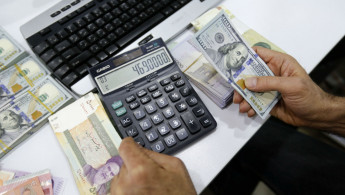Follow us on Twitter: @The_NewArab
Iran relaxing currency exchange rules ahead of US sanctions
Iran is relaxing foreign currency exchange rules ahead of new US sanctions, in an attempt to save the rial from collapse.
2 min read
Iran has seen a run on the rial [Getty]
Iran said on Sunday it will relax foreign currency exchange rules in an attempt to save the rial from collapse, as US sanctions on Tehran are about to kick in.
Signs of a woes for the rial due to the upcoming US embargo are already being seen, with Iran's currency
losing half of its value since April.
The new measure, it is hoped, will help ease some of the economic burden from the US sanctions.
Tehran enforced a ban on trading the Iranian currency outside the official rate of 42,000 rials to the dollar in April, when it became apparant that new Iran sanctions would resume.
These rules were relaxed on Sunday, with the central bank permitting allow bureaus to sell and buy dollars outside official rates for Iranians travelling abroad, state TV reported.
The announcement slightly strengthened to rial which went from 103,000 to the dollar on Saturday, to 98,500, according to Reuters, which used the Bonbast.com as a benchmark.
Central Bank Governor Abdolnaser Hemmati, made a defiant speech hours before the new US sanctions kick-in at 4am GMT on Tuesday.
"This shows our power. The same day you (Americans) impose sanctions we open our economy. We have no problems, so why should our people worry?," he said, as the Central Bank announced the new rules.
He said that floating the rial will avoid Iran's reserves being depleted to prop up the currency.
"The central bank will try not to interfere in setting the price of hard currencies, which will be determined by supply and demand, however, the bank's supervision will prevent unbridled (market swings) and the creation of a black market," he added.
Signs of a woes for the rial due to the upcoming US embargo are already being seen, with Iran's currency
losing half of its value since April.
The new measure, it is hoped, will help ease some of the economic burden from the US sanctions.
Tehran enforced a ban on trading the Iranian currency outside the official rate of 42,000 rials to the dollar in April, when it became apparant that new Iran sanctions would resume.
These rules were relaxed on Sunday, with the central bank permitting allow bureaus to sell and buy dollars outside official rates for Iranians travelling abroad, state TV reported.
The announcement slightly strengthened to rial which went from 103,000 to the dollar on Saturday, to 98,500, according to Reuters, which used the Bonbast.com as a benchmark.
Central Bank Governor Abdolnaser Hemmati, made a defiant speech hours before the new US sanctions kick-in at 4am GMT on Tuesday.
"This shows our power. The same day you (Americans) impose sanctions we open our economy. We have no problems, so why should our people worry?," he said, as the Central Bank announced the new rules.
He said that floating the rial will avoid Iran's reserves being depleted to prop up the currency.
"The central bank will try not to interfere in setting the price of hard currencies, which will be determined by supply and demand, however, the bank's supervision will prevent unbridled (market swings) and the creation of a black market," he added.
There will also be no limits on bringing foreign money and gold into the country.
The new measures appear not only aimed at the new US sanctions, but also a response to popular protests that have broken out across Iran due to economic mismanagement.
Hardliners blame moderate President Hassan Rouhani for Iran's economic woes, and have summoned him to parliament for questions on the situation.
The first set of sanctions on Iran will begin Tuesday with an embargo on carpet and car exports.
A second set of sanctions on Iran will target oil exports and the the central bank.
Iran fears a run on the rial will herald the currency's collapse.
The new measures appear not only aimed at the new US sanctions, but also a response to popular protests that have broken out across Iran due to economic mismanagement.
Hardliners blame moderate President Hassan Rouhani for Iran's economic woes, and have summoned him to parliament for questions on the situation.
The first set of sanctions on Iran will begin Tuesday with an embargo on carpet and car exports.
A second set of sanctions on Iran will target oil exports and the the central bank.
Iran fears a run on the rial will herald the currency's collapse.





 Follow the Middle East's top stories in English at The New Arab on Google News
Follow the Middle East's top stories in English at The New Arab on Google News


